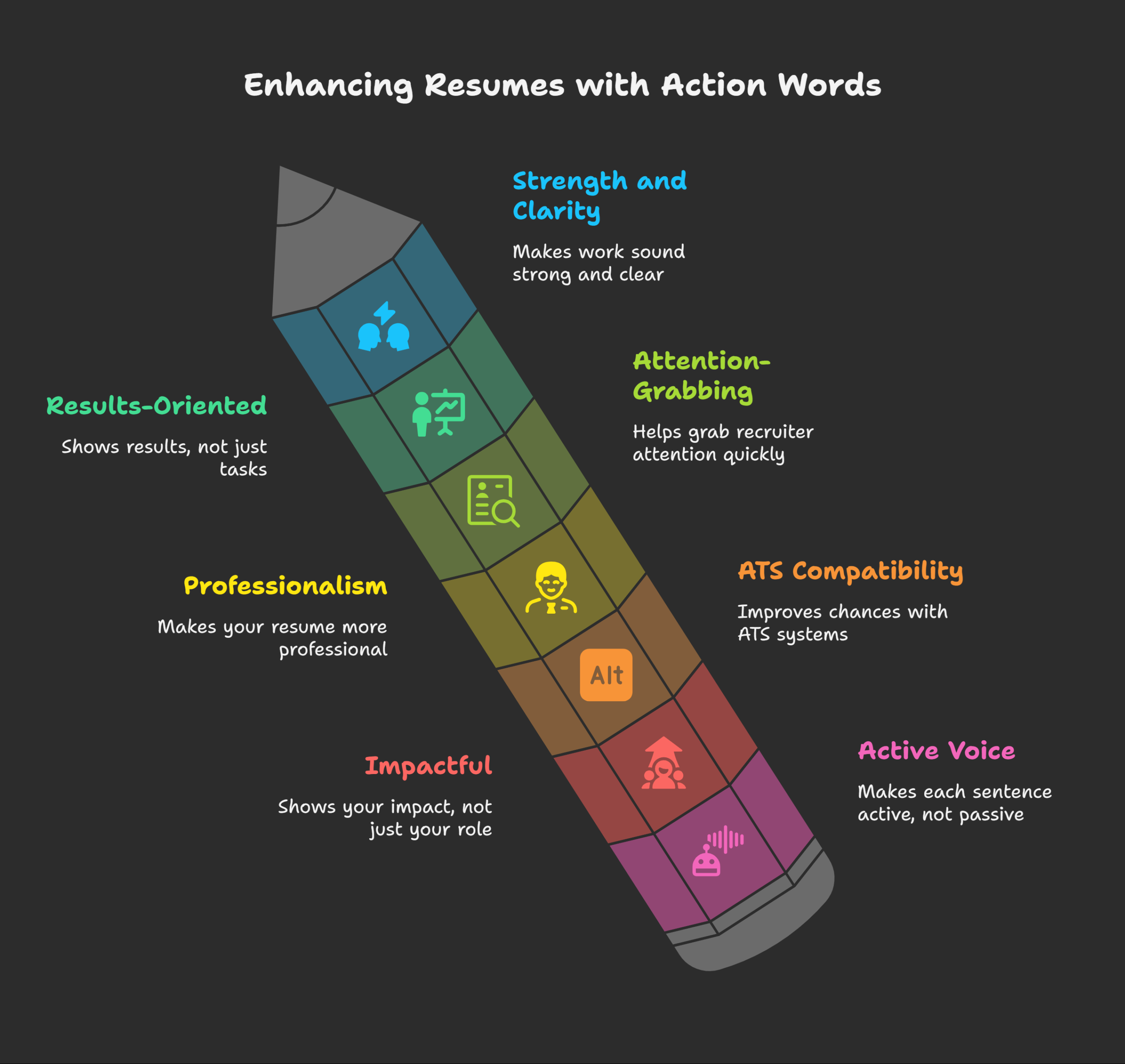Table of Contents
Boost Your Skills & Kickstart Your Career!
Employability and Personality Development Course by Entri App: Enhance your communication, confidence, and job-ready skills to excel in your career.
Join Now!Frequently Asked Questions
What are resume action words, and why should I use them?
Resume action words are strong, specific verbs that describe your accomplishments, responsibilities, and skills in a dynamic way. Instead of using dull phrases like “responsible for,” action words such as “led,” “achieved,” or “designed” clearly demonstrate what you did and how you added value. These words bring clarity and confidence to your resume, making it easier for recruiters to see your impact. Action words also help your resume stand out in both human and Applicant Tracking System (ATS) reviews. By starting each bullet point with a powerful verb, you show that you’re proactive and results-driven.
How do resume action words help with Applicant Tracking Systems (ATS)?
Applicant Tracking Systems scan resumes to filter out candidates based on keywords and relevance. If your resume lacks specific verbs and keywords related to the job, it may not pass the system’s initial scan. Resume action words that match the job description increase your chances of being noticed by ATS software. Using the right verbs ensures that your skills are both readable and searchable by machines. This improves your resume’s visibility and gets it into the hands of a recruiter.
How do I choose the right action words for my resume?
To choose the right action words, begin by reviewing the job description carefully. Identify the key verbs used and try to reflect similar ones in your resume if they match your experience. Make sure the words you use clearly represent what you actually did and align with the role you’re applying for. Use leadership verbs for managerial roles, achievement-focused verbs for sales or performance-based roles, and technical verbs for industry-specific tasks. Avoid generic or vague verbs like “worked” or “did,” and always choose verbs that describe action and impact.
Can using too many action words hurt my resume?
Yes, overusing action words or repeating the same few verbs too often can make your resume sound forced or robotic. While action words are helpful, variety and relevance matter more. Avoid stuffing every sentence with intense verbs if they don’t apply to the task. Use action words naturally and in moderation to maintain a smooth and professional tone. Aim to balance strong verbs with clear descriptions and measurable results.
Are resume action words different for different industries?
Yes, the most effective action words often depend on the industry or role. For example, a marketing professional might use words like “launched,” “promoted,” or “influenced,” while an engineer may choose verbs like “designed,” “built,” or “implemented.” Similarly, those in education might prefer “mentored,” “facilitated,” or “guided.” Always tailor your resume to your industry by using action words that reflect the language and expectations of that field. Industry-specific verbs help employers quickly see that you’re a good fit.
Can I use the same action word more than once in my resume?
Yes, you can repeat action words, but it’s best to avoid overuse. Repetition can make your resume feel repetitive and less engaging. Instead, try using synonyms or related verbs that convey similar actions with variety. For instance, instead of using “led” in every role, consider “directed,” “oversaw,” or “guided” depending on the context. This makes your resume more readable and shows the range of your skills more effectively.
What’s the difference between action words and buzzwords?
Action words are concrete, specific verbs that describe what you did—such as “created,” “analyzed,” or “delivered.” Buzzwords are often vague or overused phrases like “team player,” “hard worker,” or “go-getter.” While buzzwords sound nice, they don’t provide much evidence of your skills or accomplishments. Action words focus on your actions and impact, making them far more effective on a resume. Avoid filler terms and use verbs that demonstrate your value clearly.
Where exactly should I use action words in my resume?
Action words should be used at the beginning of each bullet point under your job experience. They can also appear in your summary, objective, and project descriptions. Starting with a strong verb helps set a confident tone and highlights your accomplishments right away. You can also use action words in your cover letter and LinkedIn profile for consistency. Make sure every key point starts with a verb that reflects your responsibility or result.
How can action words make a difference in my job search?
Action words help communicate your skills, achievements, and impact quickly and effectively. They show employers that you’re proactive and capable of delivering results. In a competitive job market, well-chosen verbs can help your resume rise above others with similar experience. Recruiters and hiring managers often skim resumes, so bold, clear verbs catch their attention fast. By using the right words, you present yourself as confident, competent, and ready for the role.
Can action words replace measurable results on a resume?
No, action words should support—not replace—quantifiable results. While verbs like “achieved” or “boosted” show initiative, they are more powerful when paired with data. For example, “Increased sales by 25% in one quarter” is stronger than just saying “Increased sales.” Action words help structure your resume, but numbers give your statements weight. Use both together to make your achievements more convincing and impressive.













